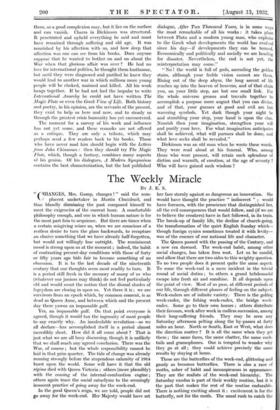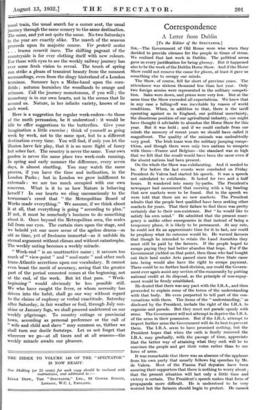Weekly Miracle The
E. S. BY J. " CIHANGES, Mrs. Gamp, changes ! " said the corn- k placent undertaker in Martin Chuzzlewit, and thus blandly dismissing the past composed himself to meet the exigencies of the current hour. A comfortable philosophy enough, and one in which human nature is for the most part fain to acquiesce. But there are times when a certain misgiving seizes us, when we are conscious of a restless desire to turn the glass backwards, to recapture an elusive something that we have already half-forgotten, but would not willingly lose outright. The reminiscent mood is strong upon us at the moment ; indeed, the habit of contrasting present-day conditions with those of forty or fifty years ago bids fair to become something of an obsession. It is to the last decade of the nineteenth century that our thoughts seem most readily to turn. It is a period still fresh in the memory of many of us who (whatever our juniors may think) do not feel particularly old and would scout the notion that the dismal shades of fogeydom are closing in upon us. Yet there it is ; we are survivors from an epoch which, by common consent, is as dead as Queen Anne, and between which and the present day there yawns an impassable gulf.
Yes, an impassable gulf. On that point everyone is agreed, though it would tax the ingenuity of most people to say exactly why. An incalculable revolution—so we all declare—has accomplished itself in a period almost incredibly short. How did it all come about ? That is just what we are all busy discussing, though it is unlikely that we shall reach any agreed conclusion. There was the War, of course ; but the whole responsibility cannot be laid in that grim quarter. The tide of change was already running strongly before the stupendous calamity of 1914 burst upon the world. Some will have it that the old regime died with Queen Victoria ; others (more plausibly) with the coming of the internal-combustion engine ; others again trace the social cataclysm to the seemingly innocent practice of going away for the week-end.
In the good Queen's reign, we are told, people did not go away for the week-end. Her Majesty would have set her face sternly against so dangerous an innovation. She would have thought the practice " indiscreet " ; would have foreseen, with the prescience that distinguished her, all the evil consequences that would follow, and (if we are to believe the croakers) have in fact followed, in its train. The break-up of family life, the decline of church-going, the transformation of the. quiet English Sunday which— though foreign cynics sometimes treated it with levity— was of the essence of our national life and character.
The Queen passed with the passing of the Century, and a new era dawned. The week-end habit, among other social changes, has taken firm root. Let us be candid, and allow that there are two sides to this weighty question. To no two people does it present quite the same aspect. To some the week-end is a mere incident in the trivial round of social duties.; to others a grand hebdomadal escape into fresh air and sunshine. It all depends upon the point of view. Most of us pass, at different periods of our life, through different phases of feeling on the subject. Week-enders are of infinite variety: There is the golfing week-ender, the fishing week-ender, the bridge week- ender. Some go to their own homes ; others distribute their favours, week after week in endless succession, among their long-suffering friends. They may be seen any Saturday afternoon pelting along the by-passes at forty miles an hour. North or South, East or West, what does the direction matter ? It is all the same when they get there ; the same faces, the same chatter, the same cock- tails and gramophones. One is tempted to wonder why they go at all ; they could achieve precisely the same results by staying at home.
These are the butterflies of the week-end, glittering and gaudy as becomes butterflies. There is also a race of moths, sober of habit and inconspicuous in appearance. They are the realists of the week-end hierarchy. The Saturday exodus is part of their weekly routine, but it is the part that makes the rest of the routine endurable. There is nothing exciting about it : excitement is for the butterfly, not for the moth. The usual rush to catch the usual train, the usual search for a corner seat, the usual journey through the same scenery to the same destination. The same, and yet not quite the same. No two Saturdays jn the year are exactly alike. The march of the seasons proceeds upon its majestic course. Ver proterit aestas bruma recurrit mere. The shifting pageant of the countryside is for ever clothing itself with new, colours. For those with eyes to see the weekly, railway journey has ever some fresh vision to reveal. The touch of spring can strike a gleam of transient beauty from the meanest surroundings, even from the dingy hinterland of a London terminus. Summer lays a Midas-hand upon the corn- fields ; autumn burnishes the woodlands to orange and crimson. Call the journey monotonous, if you will ; the monotony is in our own hearts, not in the scenes that lie around us. Nature, in her infinite variety, knows of no such word.
• Here is a suggestion for regular week-enders—to those of the moth persuasion, be it understood : it- would be idle to offer suggestions to the butterflies. Give your imagination a little exercise ; think of yourself as going week by week, riot to the same spot, but to a different destination every time. You will find, if only you let the illusion have fair play, that it is no mere flight of fancy but sober fact. The country is never the same. Your own garden is never the same place two week-ends running. In spring and early summer the difference, every seven days, is almost startling. You may watch the same process, if you have the time and inclination, in the London Parks ; but in London we grow indifferent to externals : we are too much occupied with our own concerns. What is it to us how Nature is behaving herself ? - In our hearts we cling unconsciously to the townsman's creed that " the Metropolitan Board of Works made everything." We assume, if we think about it at all, that everything is going " according to plan." If not, it must be somebody's business to do something about it. Once beyond the Metropolitan area, the scales fall from our eyes. The curtain rises upon the stage, and we behold yet one more scene of the ageless drama—as old as time, yet of freshness immortal—as it unfolds its eternal argument without climax and without catastrophe. The weekly outing becomes a weekly miracle.
" Week-end " is an unattractive name ; it savours too much of " view-point " and " soul-mate " and other such trans-Atlantic accretions upon our vocabulary. It cannot even boast the merit of accuracy, seeing that the greater part of the period connoted comes at the beginning, not at the end, of the week. But let that pass. " Week- beginning " would obviously be less possible still. We who have caught the fever, or whom necessity has driven into the habit, shall go our way without regard to the claims of euphony or verbal exactitude. Saturday after Saturday, in fair weather or foul, through July sun- shine or January fogs, we shall proceed undeterred on our weekly pilgrimage. To country cottage or provincial town, according as personal preference or the call of " wife and child and slave " may summon us, thither we shall turn our docile footsteps. Let us not forget that wherever we go--at all times and at all seasons—the weekly miracle awaits our pleasure.































 Previous page
Previous page